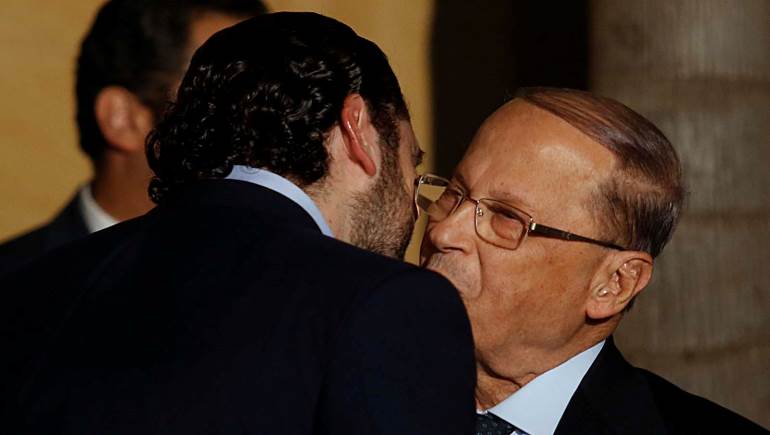Time for a new arrangement in Lebanon
Mohamad Kawas/The Arab Weekly/October 15/17
For once, the anti-Hezbollah mood in the US Congress is in sync with US President Donald Trump’s opposition to the Iran nuclear deal.
Both Saad Hariri, head of the Future Movement, and Samir Geagea, head of the Lebanese Forces party, gave their followers many reasons why they were backing Michel Aoun for the presidency of Lebanon. Both leaders likely hoped their concessions would convince Hezbollah’s candidate to start viewing Lebanon as a free and sovereign state, free of foreign agendas.
Hariri, Geagea and their followers know very well that to stay in power one needs to accept the supremacy of military might over politics. It might be argued, however, that their choice was not dictated by local considerations. It is possible that the hawks of the March 14 Alliance took the major regional and international powers’ apparent lack of interest in Lebanese affairs as a hint to accept reality and live with it to protect the country from being engulfed by the fires burning beyond its borders.
Aoun’s election as president of Lebanon was blessed by Saudi Arabia. Saudi authorities hoped that, by ending the power vacuum in Baabda Palace, Lebanon would progress from being governed as a minor state to achieving the status of a full country.
Aoun’s presidency, however, has not lived up to that hope. If anything, it has revealed that whoever delivered the keys to Baabda Palace was following rules of conduct that logically intersected with the interests of a coalition between Tehran and Damascus.
Only two options are available: Abandon the alliance between Hariri and Geagea altogether or look for outside factors to keep the deal alive. While there are no signs of Hariri and Geagea wanting to back out of the current power-sharing formula, at least until the coming elections, there are signs outside of Lebanon that the rules of the game are about to change.
Anti-Hezbollah sanctions recently approved by the US Congress indicate that the US government does not believe in the inevitability of having a Hezbollah mini-state inside Lebanon. Washington no longer seems willing to tolerate the situation, while the Lebanese Army is accused of sharing its weapons and military might with armed militias.
For once, the anti-Hezbollah mood in the US Congress is in sync with US President Donald Trump’s opposition to the Iran nuclear deal. They both seem to have had it with Iran’s presence in Syria and its expansionist plans.
Riyadh has launched a diplomatic campaign to Lebanon. A new Saudi ambassador in Beirut has been appointed. There have been multiple visits to Riyadh by Lebanese delegations and many others can be expected to follow. Riyadh seems determined to lay real strategic grounds for its policies towards Lebanon.
Riyadh is not interested in shaking the status quo in Lebanon. It hopes to renew its historical and political ties with the country. Hezbollah and, by association, the regime in Iran are more than irked by this renewed energy. It goes against their plan to return Lebanon to Syria’s orbit.
The Saudi approach to Lebanon is in sync with the international attitude towards the region. Despite doubts about the US administration’s policies, Saudi Arabia shares Washington’s views on Iran and Hezbollah. Riyadh has its own agenda when it comes to its relations with Moscow. Saudi Arabia and Russia see a need for strong bilateral relations to safeguard their interests in the region, hence Saudi King Salman bin Abdulaziz Al Saud’s historic visit to Moscow.
Russia is aware that its presence in Syria was largely facilitated by Riyadh’s tacit blessing. It knows that, sooner or later, it will have to deal with the floating political mines represented by the Saudi- Iranian conflict in the region. In that context, Saudi Arabia has emerged as the major player in the Middle East, with its fingers in every hot pie in the region.
Saudi Arabia is committed to not letting Lebanon fall in the Iranian basket. Speaking in Moscow, King Salman reiterated that Iran’s presence in the region is exceptional and will be short-lived. The Saudis have been consistent in their approach to all the hotspots in the region, whether in Beirut, Baghdad, Sana’a or Damascus; Iran must be contained within its borders, goes the refrain. On that point, all the world’s capitals agree, including Moscow.
Riyadh’s fresh discourse shows that the region is on the verge of reaching real changes. Lebanon will be concerned by them and therefore the Hariri-Geagea arrangement will soon be outdated. It will have to be replaced by an arrangement that includes other political voices.
http://www.thearabweekly.com//?id=9432






















